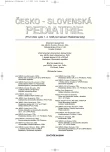-
Medical journals
- Career
Insulinoma – the Cause of Relapsing Hypoglycemia in a 16-year Patient
Authors: M. Brndiarová 1; M. Čiljaková 1; E. Hyrdelová 1; R. Hyrdel 2; J. Janík 3; K. Macháleková 4; Peter Bánovčin 1
Authors‘ workplace: Klinika detí a dorastu, Jesseniova lekárska fakulta Univerzity Komenského, Martinská fakultná nemocnica, Martin prednosta prof. MUDr. P. Bánovčin, CSc. 1; Interná klinika – Gastroenterologická, Jesseniova lekárska fakulta Univerzity Komenského, Martinská fakultná nemocnica, Martin prednosta prof. MUDr. R. Hyrdel, CSc. 2; Klinika transplantačnej a cievnej chirurgie, Jesseniova lekárska fakulta Univerzity Komenského, Martinská fakultná nemocnica, Martin prednosta doc. MUDr. Ľ. Laca, PhD., mim. prof. 3; Ústav patologickej anatómie, Jesseniova lekárska fakulta Univerzity Komenského, Martinská fakultná nemocnica, Martin prednosta prof. MUDr. L. Plank, CSc. 4
Published in: Čes-slov Pediat 2009; 64 (3): 115-119.
Category: Case Report
Overview
The authors present the case of a 16-year boy with 1.5-year history of tonic-clonic seizures with unconsciousness caused by hypoglycemia associated with insulinoma. In admission of the patient to the clinic the glycemia levels were in the range of 2.2 – 6.1 mmol/l, values of C-peptide and insulin were increased (1948.9 pmol/l and 26.74 IU/ml, respectively). In oral glucose tolerance test (oGTT) the concentrations of C-peptide were in the range of 1158 – 4526 pmol/l, the level of insulin was 5.7 – 80.1 mU/l, glucose concentration was in the area of glucose tolerance disorder, the levels of TSH were elevated (6.3 mIU/l). The presence of insulinoma became suspected. CT examination and octreotide scan were negative as far as tumorous changes were concerned. The executed endoscopic ultrasonographic examination confirmed the finding of two foci in pancreas, of which the first one was not precisely localized in the region between head and body of pancreas with the size of 19 x 20 mm, the second focus was localized in the area in the area of tail (left extremity). In the patient distal spleen saving pancreatectomy was performed. Histological examination of the resected part of pancreas unambiguously confirmed the diagnosis of well differentiated endocrine tumor of pancreas of 16 mm size. Immunochemical examination of the tumor confirmed among others neuroendocrine differentiation confirmed by insulin expression as well.
The patient was dismissed after three-month hospitalization into home treatment. Nine months after the operation the glucose levels were in the physiological range, the concentrations of insulin as well as C-peptide after oGTT were also normal. The level of TSH was higher than normal (4.28 mIU/l). The clinical picture was characterized by loss of body weight from 95 kg upon admission to present 67kg body weight (stature of 170 cm).Key words:
insulinoma, child age, hypoglycemia
Sources
1. Macháleková K, Kajo K. Bioptická diagnostika pankreatických endokrinných tumorov. Onkológia 2007;2(6): 345–348.
2. Klimstra DS, Adsay NV. Benign and malignant tumors of the pancreas. In: Odze RD. Surgical Pathology of the GI Tract, Liver, Biliary Tract, and Pancreas. Saunders, 2004 : 699–736.
3. De Lellis RA, Lloyd RV, Heitz PU, et al. World Health Organization Classification of Tumours. Pathology and Genetics of Tumours of Endocrine Organs 2004 : 320.
4. McLean A. Endoscopic ultrasound in the detection of pancreatic islet cell tumours. Cancer Imaging 2004;4 : 84–91.
5. Graeme-Cook F. Neuroendocrine tumors of the GI tract and appendix. In: Odze RD. Surgical Pathology of the GI Tract, Liver, Biliary Tract, and Pancreas. Saunders, 2004 : 483–504.
6. Božíková J, Hyrdel R. Inzulinóm. In: Jurgoš Ľ, Kužela L, Hrušovský Š, et al. Gastroenterológia. 1 vyd. Bratislava: VEDA, 2006 : 593–595.
7. Strong VE, Shifrin A, Inabnet WB. Rapid intraoperative insulin assay: a novel method to differentiate insulinoma from nesidioblastosis in the pediatric patient. Annals of Surgical Innovation and Research 2007;1 : 6.
8. Rosch T, Lorenz R, Braig C, et al. Endoscopic ultrasound in pancreatic tumor diagnosis. Gastrointest. Endosc. 1991;37 : 347–352.
9. Legmann P, Vignaux O, Dousset B, et al. Pancreatic tumors: comparison of dual-phase helical CT and endoscopic sonography. J. Roentgenol. 1998;170 : 1315–1322.
10. Ardengh JC, Valiati LH, Geocze S. Identification of insulinomas by endoscopic ultrasonography. Rev. Assoc. Med. Bras. 2004;50(2): 167–171.
11. Kaczirek K, Asari R, Scheuba C, et al. Organic hyperinsulinism and endoscopic surgery. Wien Klin. Wochenschr. 2005;117(1–2): 19–25.
12. Lo CY, Chan WF, Lo CM, et al. Surgical treatment of pancreatic insulinomas in the era of laparoscopy. Surg. Endosc. 2004;18(2): 297–302.
13. Dai MH, Zhao YP, Liao Q, et al. Surgical treatment of pancreatic insulinoma by laparoscopy. Zhonghua Wai Ke Za Zhi. 2006;44(3): 165–168.
Labels
Neonatology Paediatrics General practitioner for children and adolescents
Article was published inCzech-Slovak Pediatrics

2009 Issue 3-
All articles in this issue
- Czech Pediatric Society in 2009
- Wiskott-Aldrich Syndrome – Disease Requiring Early Transplantation of Hemopoietic Stem Cells
- Insulinoma – the Cause of Relapsing Hypoglycemia in a 16-year Patient
- Disorder of Growth and Development in a Boy with X-bound Ichthyosis, Protracted Delivery and Low Level of Estriol in the Mother during Pregnancy
- Food-induced Anaphylaxis in Children
- Paediatrician and Therapy of Orofacial Clefts
- The Risk of Child Obesity
- Czech-Slovak Pediatrics
- Journal archive
- Current issue
- Online only
- About the journal
Most read in this issue- Insulinoma – the Cause of Relapsing Hypoglycemia in a 16-year Patient
- Wiskott-Aldrich Syndrome – Disease Requiring Early Transplantation of Hemopoietic Stem Cells
- Disorder of Growth and Development in a Boy with X-bound Ichthyosis, Protracted Delivery and Low Level of Estriol in the Mother during Pregnancy
- Food-induced Anaphylaxis in Children
Login#ADS_BOTTOM_SCRIPTS#Forgotten passwordEnter the email address that you registered with. We will send you instructions on how to set a new password.
- Career

